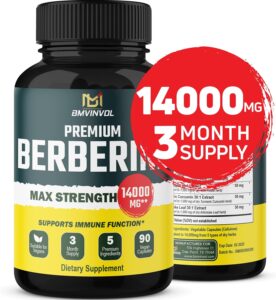Benefits of Berberine for Anti-Aging
Berberine, a natural compound found in various plants such as barberry, goldenseal, and Oregon grape, has gained popularity in the health and wellness community for its potential anti-aging benefits. Research has shown that berberine possesses properties that may help combat the effects of aging at a cellular level, making it a promising supplement for those looking to maintain a youthful and vibrant appearance.
One of the key benefits of berberine for anti-aging is its ability to activate an enzyme called AMPK (adenosine monophosphate-activated protein kinase), which plays a crucial role in regulating metabolism and energy production in the body. By activating AMPK, berberine helps enhance cellular functions and promote longevity.
In addition to its effects on AMPK, berberine also exhibits potent antioxidant properties, which can help protect cells from damage caused by free radicals. Free radicals are unstable molecules that can accelerate the aging process and lead to various age-related conditions. By neutralizing these free radicals, berberine helps reduce oxidative stress and support overall skin health.
Berberine has also been shown to have anti-inflammatory effects, which can be beneficial for combating age-related inflammation. Chronic inflammation is a common feature of aging and is associated with a wide range of health issues, including wrinkles, sagging skin, and chronic diseases. By reducing inflammation, berberine may help slow down the aging process and promote healthy aging.
Moreover, berberine has been studied for its potential effects on cellular aging, particularly in relation to telomeres. Telomeres are protective caps at the end of chromosomes that shorten with each cell division, eventually leading to cell aging and death. Preliminary research suggests that berberine may help preserve telomere length, which could have implications for longevity and age-related diseases.
The benefits of berberine for anti-aging are multifaceted, encompassing its ability to activate AMPK, neutralize free radicals, reduce inflammation, and potentially preserve telomere length. berberine into a comprehensive anti-aging regimen may help support overall health and well-being as you age.
Berberine Supports Skin Health
 Berberine is a naturally occurring compound found in various plants, including goldenseal, Oregon grape, and barberry. It has gained popularity in recent years for its potential anti-aging benefits, particularly in supporting skin health. Research suggests that berberine possesses antioxidant and anti-inflammatory properties that can help combat signs of aging and promote overall skin vitality.
Berberine is a naturally occurring compound found in various plants, including goldenseal, Oregon grape, and barberry. It has gained popularity in recent years for its potential anti-aging benefits, particularly in supporting skin health. Research suggests that berberine possesses antioxidant and anti-inflammatory properties that can help combat signs of aging and promote overall skin vitality.
One of the key ways berberine contributes to skin health is by its ability to neutralize free radicals. Free radicals are unstable molecules that can damage skin cells and accelerate the aging process. By scavenging these free radicals, berberine helps protect the skin from oxidative stress and environmental aggressors, such as UV radiation and pollution.
Moreover, berberine has been shown to inhibit the activity of enzymes that break down collagen and elastin in the skin. Collagen and elastin are essential proteins that maintain skin elasticity and firmness. By preserving these structural proteins, berberine can help reduce the appearance of wrinkles and sagging skin, promoting a more youthful complexion.
In addition to its antioxidant and anti-aging properties, berberine also exhibits anti-inflammatory effects that can benefit the skin. Chronic inflammation is associated with various skin conditions, such as acne, eczema, and psoriasis, as well as accelerated aging. By reducing inflammation, berberine helps promote a calmer, healthier complexion and may aid in preventing age-related skin issues.
Berberine’s multifaceted approach to skin health, including its antioxidant, anti-aging, and anti-inflammatory properties, makes it a promising ingredient for those looking to maintain youthful and radiant skin. berberine into your skincare routine or diet may help support overall skin health and combat the visible signs of aging.
To learn more about the benefits of berberine for anti-aging and skin health, visit skincare.com.
The Role of Berberine in Cellular Aging Process
Berberine, a bioactive compound found in various plants like Barberry, has gained significant attention for its potential anti-aging effects on the cellular aging process. Research has shown that Berberine possesses properties that can help in combating age-related issues at the cellular level, thus contributing to overall longevity and well-being.
One of the key ways Berberine impacts the cellular aging process is through its ability to activate an enzyme called AMPK (adenosine monophosphate-activated protein kinase). AMPK is known as a “master regulator” of cellular energy balance, playing a crucial role in various metabolic processes. By activating AMPK, Berberine helps enhance cellular metabolism, improve mitochondrial function, and regulate cellular energy production.
Moreover, Berberine has been found to have potent antioxidant properties, which play a vital role in reducing oxidative stress and combating free radical damage. Oxidative stress is a major contributor to cellular aging, leading to DNA damage, protein degradation, and impaired cellular function. By scavenging free radicals and boosting the body’s antioxidant defense system, Berberine helps protect cells from premature aging and supports overall cellular health.
Furthermore, Berberine has been shown to modulate various signaling pathways involved in inflammation and cellular senescence. Chronic low-grade inflammation is a common feature of aging and age-related diseases. By inhibiting pro-inflammatory pathways and promoting anti-inflammatory responses, Berberine helps reduce inflammation at the cellular level, thereby slowing down the aging process and promoting healthy aging.
In addition to its direct effects on cellular aging, Berberine also influences other factors that contribute to overall health and longevity, such as metabolism, insulin sensitivity, and cardiovascular function. By targeting multiple pathways involved in aging and age-related diseases, Berberine offers comprehensive support for healthy aging and longevity.
To leverage the potential anti-aging benefits of Berberine, incorporating it into your daily routine through supplementation or dietary sources may be beneficial. However, it is essential to consult with a healthcare provider before starting any new supplement regimen, especially if you have underlying health conditions or are taking medications.
Berberine’s role in the cellular aging process underscores its potential as a valuable tool in promoting healthy aging and extending lifespan. By targeting key mechanisms involved in aging, Berberine offers a holistic approach to combating age-related issues and supporting overall well-being.
For more information on the benefits of Berberine for anti-aging, you can visit Healthline’s article on Berberine as a powerful supplement.
Berberine for Combating Age-Related Inflammation
Berberine, a naturally occurring compound found in various plants, particularly in the Berberis genus, has been garnering attention for its potential anti-aging properties. One of the key areas where berberine shines is in combating age-related inflammation, which is a major contributor to the aging process. Inflammation plays a significant role in various age-related diseases such as cardiovascular issues, neurodegenerative conditions, and metabolic syndrome.
Research suggests that berberine possesses powerful anti-inflammatory properties that can help reduce the levels of pro-inflammatory cytokines in the body. By inhibiting the activation of inflammatory pathways, berberine can help mitigate the chronic low-grade inflammation that tends to develop as we age. This, in turn, may lead to a decreased risk of age-related diseases and a potential improvement in overall health and longevity.
Moreover, berberine has been found to activate AMP-activated protein kinase (AMPK), a key regulator of cellular energy balance. By enhancing AMPK activity, berberine can help suppress inflammatory responses and improve mitochondrial function, which is crucial for combating age-related inflammation. Additionally, berberine has been shown to inhibit the nuclear factor-kappa B (NF-κB) pathway, a major player in driving inflammation in the body.
Berberine into your daily routine may offer a natural and effective way to combat age-related inflammation and promote overall well-being. Whether through dietary sources or supplementation, harnessing the anti-inflammatory properties of berberine could potentially pave the way for a healthier and more vibrant aging process.
The anti-inflammatory effects of berberine make it a promising candidate for combating age-related inflammation. By targeting key inflammatory pathways and enhancing cellular health, berberine has the potential to not only slow down the aging process but also improve overall health and longevity. Explore the wonders of berberine and discover a natural ally in the fight against age-related inflammation.
Berberine for Potential Longevity Effects
As research into anti-aging compounds progresses, berberine has emerged as a promising natural substance capable of offering potential longevity effects. Berberine, a bioactive compound found in various plants, including Goldenseal and Barberry, has been extensively studied for its wide-ranging health benefits, including its anti-aging properties.
Studies have shown that berberine can activate specific genes and pathways in the body that are associated with longevity and healthy aging. By targeting these pathways, berberine may help in slowing down the aging process at a cellular level, potentially leading to increased lifespan and improved overall health.
One of the key ways in which berberine may promote longevity is by its ability to combat age-related conditions such as inflammation, oxidative stress, and cellular damage. By reducing inflammation and oxidative stress, berberine helps protect cells from premature aging and supports the body’s natural repair mechanisms, contributing to longevity.
Moreover, berberine has been found to enhance mitochondrial function, which plays a crucial role in energy production and cellular metabolism. By improving mitochondrial function, berberine may help optimize cellular processes, leading to increased vitality and longevity.
In addition to its direct effects on cellular aging, berberine also exhibits potential benefits for age-related conditions such as diabetes, cardiovascular disease, and neurodegenerative disorders. By addressing these underlying health issues, berberine may contribute to overall longevity and a higher quality of life in later years.
Berberine supplements into a well-rounded anti-aging regimen along with a healthy diet, regular exercise, and other lifestyle modifications may offer a comprehensive approach to promoting longevity and healthy aging.
To learn more about the potential longevity effects of berberine, visit healthline.com for in-depth information on this topic.
Berberine shows great promise as a natural compound that may support longevity and healthy aging by targeting key pathways involved in the aging process. By incorporating berberine into a holistic anti-aging strategy, individuals may enhance their overall well-being and potentially extend their lifespan in a natural and sustainable manner.
Conclusion
Berberine emerges as a powerful natural compound that offers a multitude of anti-aging benefits. From supporting skin health to influencing the cellular aging process and combating age-related inflammation, Berberine showcases its potential in promoting longevity and overall well-being. By harnessing the diverse advantages of Berberine, individuals can explore a holistic approach to anti-aging that not only addresses external signs of aging but also targets internal mechanisms at the cellular level. Berberine into a balanced lifestyle and skincare routine may pave the way for a healthier and more vibrant aging process, enabling individuals to embrace the journey of growing older with grace and vitality.









